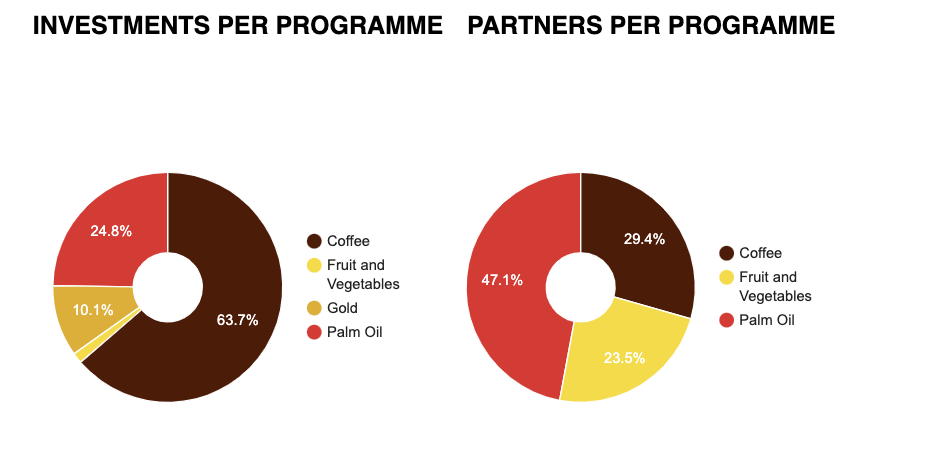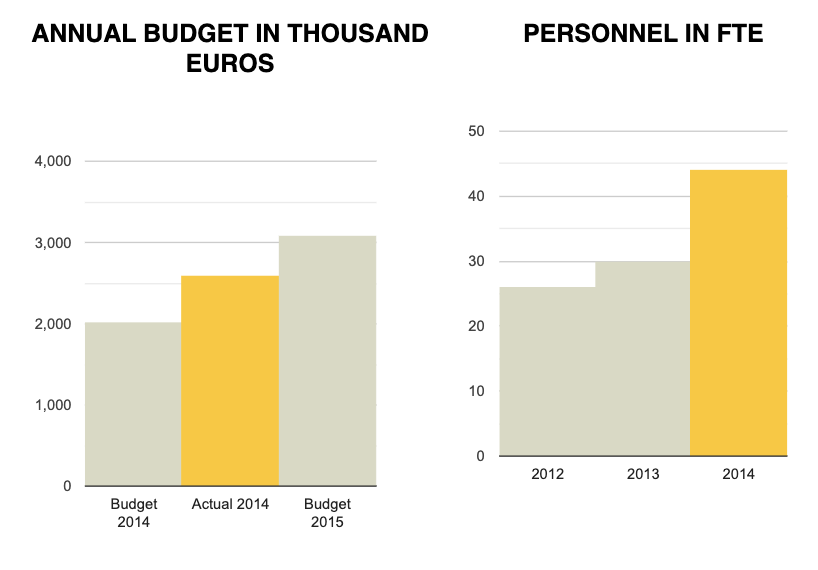REGIONAL COMMODITY PROGRAMMES
Solidaridad´s strategic approach to supporting producers is in the process of scaling up its methodology and tools to enable the training of trainers and producers in Colombia. The sustainable trade platform (STP) project, which includes the most important players in the coffee sector, is the basis for moving from the testing phase to the scaling-up phase.

Minera Yanaquihua, a small gold mining company in southern Peru, has been a pioneer in achieving Responsible Jewellery Council (RJC) certification in responsible mining. After three years of continuous improvement, supported by Solidaridad, RJC certification is an important milestone for Minera Yanaquihua that shows how small to medium gold mines can succeed by following responsible business practices in gold extraction and processing.

In 2014, the regional government of Piura passed a decree endorsing the banana technical roundtable, giving the platform a formal role and the support of an administrative office. Solidaridad has been involved in the banana platform in Peru since 2012. The other main participants are five export companies, five trade and import companies, 16 banana producer organizations and four government bodies.

In June 2014, 20 companies in the palm oil sector formally joined the Sustainable Trade Platform in Colombia, managed by Solidaridad. All participants signed a voluntary commitment to work towards the development of a sustainable palm oil sector in Colombia. Among the signatories were 20 of the most significant palm oil companies, the Deputy Minister for Agriculture and Rural Development of Colombia, and the Ambassador of the Netherlands.

EXTERNAL DEVELOPMENTS
In Colombia, last year was marked by an upturn in domestic coffee prices. Coupled with the revaluation of the dollar, the Increase in coffee prices has generated more income for producers. Nevertheless, farming groups, in general, have little motivation to maintain their certification, as the premiums are not sufficient to cover the social and environmental requirements in the standard. Solidaridad is adapting to market changes by providing more support to coffee producers through the Sustainable Trade Platform. This platform supports the work of 32 coffee grower organizations and eight companies across the country based on voluntary sustainable standards.
Higher international coffee prices translated into a 33% increase in prices paid to Peruvian coffee growers in 2014 as compared to the previous year. In addition, climate change has contributed to an outbreak of rust disease for the third year in a row, which led to 19% lower volumes during harvest nationwide. The coffee programme in Colombia and Peru has developed an initial series of guidelines with tailored recommendations on how to proceed in a new environment where climate change is a threat to the coffee industry.
For the palm oil programme in Colombia, Solidaridad obtained commitments from more than 20 companies in Colombia to formally join the Sustainable Trade Platform in June 2014. The platform agreed to support smallholders who apply sustainable agricultural practices on at least 15,000 hectares of land and to produce 200,000 metric tons of RSPO certified palm oil by 2016. The deputy Minister of Agriculture and the Ambassador of the Dutch Embassy have both given their formal support to this platform, which is administered by Solidaridad.
The banana sector in Peru, which is dominated by organic and small FLO-certified production units, is benefiting from demand for organic bananas exceeding supply in international markets. Large traders such us Fyffes, Chiquita and Del Monte have significantly expanded their operations in Peru. Solidaridad is supporting banana producers in seizing new market opportunities through the Sustainable Banana Platform. Around 60% of banana growers in Peru are involved in this platform and it has coordinated and facilitated obtaining US$ 4.5 million for improvements in infrastructure and services.
The Peruvian government has postponed the deadline for gold miners to submit two main documents in the new legal formalization process until 2016. Solidaridad continues to support miners in their efforts to comply with current regulations. In 2014, Solidaridad published an important guide on the formalization process for small-scale gold miners. This unique document guides users step by step through the complicated and rigorous new legal procedures that are required to obtain formal approval to start or re-start gold extraction and processing.

RESULTS AND PARTNERSHIPS
In Colombia, one of the companies supported by Solidaridad obtained RSPO certification for 10,131 hectares. This is the first area to achieve this out of a total of 39,000 hectares under the Farmer Support Programme (FSP), which is managed by Solidaridad. Moreover, Solidaridad partnered with more than 20 companies in the palm oil sector who formally joined the Sustainable Trade Platform in June 2014. They signed a public declaration for an RSPO-certified palm oil target, including and sustainable agricultural practices, by 2016 (see External Developments).
Main stakeholders in the Colombian coffee sector, including the most important private exporters, the National Federation of Coffee Growers (FNC) and coffee cooperatives, are also signatories of the Sustainable Trade Platform declaration. Under this framework, Solidaridad coordinates with and supports more than 40 players as well as the Government of Antioquia. The FNC is a key partner in several activities, in particular with regard to work on smart climate agriculture. Solidaridad entered into a partnership with IDH in which six competitive projects were approved and co-financed in 2014.

DONORS AND ORGANIZATIONS
The number of employees at Solidaridad Andes has increased by five over the past year, now totalling 47 full-time employees. This increase is mainly a response to the needs of coffee programme personnel in the field, both in Colombia and Peru.
Coffee programme: A leading coffee farmers project was developed by the FNC and the Andes Cooperative of Coffee Growers in Colombia. This pilot project validated the change management methodology developed by Solidaridad, which seeks to improve adoption of the technology by coffee growers. In the future, this methodology can be rolled out to include other crops. The project benefited 2,500 coffee members of the cooperative, thanks to funding from the Government of Antioquia and the Dutch Embassy.
The coffee programme in Colombia and Peru has developed a first series of guidelines, with tailored recommendations on how to work in a new environment where climate change is a threat to coffee production. This work involves a continual learning process, as we are still developing new methodologies such as measuring carbon stocks and/or reducing emissions, water capture, reforestation, and a review of proven agricultural practices that strengthen coffee resilience to climate change. This work was funded by NORAD, the Dutch Embassy and the FNC.
The gold programme has produced a guide that helps small-scale miners deal with the formalization process in Peru. This guide reflects the leading role of Solidaridad in tackling this controversial issue in Peru. This work was funded by the European Union and private donors. Together with the Alliance for Responsible Mining, Solidaridad has published a guide on “Addressing Forced Labour in Artisanal and Small-Scale Mining”.
